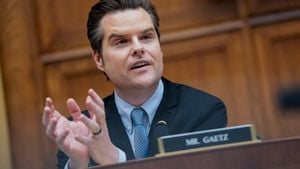The retirement savings gap has become one of the most pressing financial issues facing Americans today. With millions of workers marching toward retirement with little to no savings, the traditional methods of securing financial stability have left many behind. Yet, hope is on the horizon as state governments spearhead innovative initiatives aimed at transforming how workers save for retirement, particularly through the emergence of state auto-IRA programs. These strategies open doors for millions, especially those linked to small businesses and the gig economy, who were previously sidelined by conventional retirement plans.
The desperate need for change is highlighted by alarming statistics from the National Institute on Retirement Security. A staggering 55% of Americans fear they won't achieve financial security as they age, largely because the typical saving methods—like employer-sponsored plans—aren't accessible to all. This lack of access has bolstered the widening divide between retirees who are prepared and those who are at risk of financial hardship.
Bridging this gap is not just about individual savings; it's also about bolstering the overall economy. When workers save for retirement, they contribute to sustained economic stability and lessen the future burden on social safety nets like Social Security. Among the most effective solutions introduced are state-facilitated auto-IRAS, such as RetirePath Virginia, which is making strides to address this impending crisis.
So, what exactly are auto-IRA programs? Unlike traditional retirement accounts, auto-IRAS are individual retirement accounts (IRAS) automatically offered to employees by their employers. Workers are enrolled by default but do have the option to opt-out. This approach taps directly at the heart of the problem, countering the psychological and practical barriers often faced when saving for retirement. Most plans typically set contributions at around 3% to 5% of one’s salary, making it manageable and feasible for employees.
Take Virginia’s RetirePath, for example. Launched recently, it connects private-sector workers with much-needed automatic saving opportunities. After just one year, over 10,000 Virginians began contributing to their personal IRAS. This is not just about numbers; it’s about fostering a new savings mentality within the community.
State auto-IRAS are revolutionizing savings by shifting the responsibility off small businesses. Figures show more than 900,000 workers have generated nearly $1.7 billion across 12 such state programs. States like Oregon, California, and Illinois have already paved the way, showcasing impressive results from their initiatives. Importantly, these programs are particularly significant for lower-wage workers and part-time employees, who often lack viable retirement saving options.
The simplicity and low touch of auto-IRAS mean employers can facilitate saving without assuming the weighty responsibilities often associated with traditional retirement plans. This accessibility opens the door for thousands of underserved workers to participate regularly without cumbersome administrative hassle. Employers can enroll employees effortlessly, giving individuals the power and responsibility over their financial futures.
But what makes the concept of auto-IRAS particularly powerful is their potential impact on small and medium-sized businesses (SMBs). These businesses often find themselves trapped by the complications and costs of conventional retirement plans, which typically limit their ability to offer meaningful benefits to employees. State auto-IRA programs alleviate these burdens, allowing SMBs to offer retirement savings without the complex overhead. It’s about empowerment for both workers and companies, promoting job retention and satisfaction along the way.
Laurie Rowley, CEO of Icon, which is at the forefront of the portable retirement solution movement, shared insights on why traditional 401(k) plans fall short. “The traditional 401(k) was created during an era when large corporations dominated the workforce. They were never truly adaptable to the diverse and fluid nature of today’s job market,” Rowley explicates. By shifting toward portable retirement plans (PRPs), the modern system encourages savings ownership from day one, allowing people to easily retain and grow their savings regardless of job shifts.
Portable retirement plans, like those offered by Icon, represent the next step: enabling flexibility and continuity for workers. When job transitions occur—whether from freelancing to full-time employment or switching companies—these plans follow the employee seamlessly, eliminating the complex rollovers associated with traditional options. This security fosters consistent growth of retirement savings, something desperately needed as many employees only hold sporadic or diminished retirement savings elsewhere.
This new paradigm isn’t just another niche trend either; the effects ripple throughout the economy. Programs like RetirePath serve to anchor individuals' futures, stabilizing not only their finances but also enhancing the general economic outlook. With more Americans saving adequately, the nation becomes less dependent on public aid, promoting healthier financial practices across the board.
Several states have already introduced auto-IRA programs, and more are exploring the benefits of adopting similar models. Alongside Virginia, states like California and Illinois have initiated their own successful plans, stirring conversations across the country. Notably, the Georgetown University Center for Retirement Initiatives reports significant strides—900,000 workers saving upwards of $1.7 billion through the various auto-IRA programs already established. This wave of change signals hope for millions of workers who previously faced hurdles overflowing with red tape.
With convincing data indicating just how useful automatic IRAS can be, several other states are examining pilot programs. Vermont, Minnesota, and Hawaii are potential players next to the likes of California and Oregon, hoping to replicate such schemes to boost participation and savings rates among their constituencies. Even states not currently operating programs are taking the first steps to explore the long-held concept of auto-IRAS, indicating momentum building across the country.
Experts agree this model shouldn’t just be viewed as another retirement savings tool—it's reshaping the financial literacy and path forward for many employees, teaching them not only how to save but also the benefits of starting early.
Imagine the possibilities if all states adopted auto-IRAS? Millions of workers could become empowered to save without the anxiety of overwhelming administrative procedures or the fear of missing out on benefits. This could lead to the formation of new norms surrounding retirement savings, culminating in stronger financial foundations for future generations.
All indications point to state auto-IRAS as significant advancements toward alleviating the retirement savings crisis. Faced with years of stagnant wage growth and the decline of traditional pension plans, this forward-thinking reform could turn the tide, helping those often left behind to forge paths of financial security. After all, the ability to save for tomorrow should not be limited by the confines of one’s employer or job status. With auto-IRAS, everyone can have the chance to build their financial future.
By making retirement savings simpler, accessible, and automatic, state auto-IR programs are marking the dawn of what can be termed as “Retirement 3.0” – offering flexible solutions embraced by today’s innovative workforce. The success stories echo across the nation as individuals step up, driven by the realization they can actively participate in their retirement planning.



